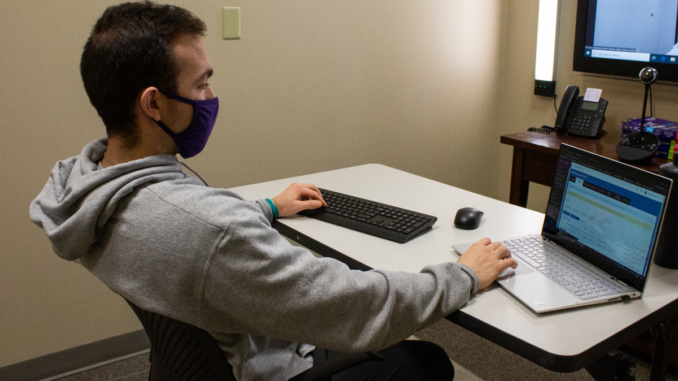
Anyone who has ever been a college senior understands the stress that comes with the last semester, preparing for graduation and searching for a job. A pandemic and economic recession on top of that have many in the class of 2021 wondering how they’re supposed to find a job right now.
According to the Household Pulse Survey conducted by the United States Census Bureau in conjunction with other federal agencies in 2020, young adults living alone — specifically, 18 to 29-year-olds and 30 to 44-year-olds — have reported significantly higher levels of anxiety and depression than older adults.
“It’s hard for people not to have additional stress right now,” Jenni Nuhn, Career Center assistant director, said. “The upside of my job is helping someone think through alternative ways to work through something.”
Nuhn said the Career Center often sees an influx of seniors during the spring semester before graduation. She explained that many of these seniors come in without any idea of what they’re going to do after graduation.
Nuhn said seniors this year, however, seem to be in a less stressful position than the class of 2020.

“This group of graduating seniors have had an opportunity to let the job market sort of settle in and organizations figure out how to do things virtually and to make changes to their business to make it work more efficiently,” Nuhn said.
Despite being in a less stressful position, Nuhn explained that there is usually an uptick in stress surrounding the Career Expo, which is being held Thursday in a virtual format. She said networking is already a generally uncomfortable thing to do, but there is added pressure with COVID-19 and finding a job as a new graduate.
David Shah, a student worker at the Career Center, is among the seniors set to graduate this spring. Shah is also an international student from Nepal, but he is currently searching for a job in the United States.
Shah said one effect the pandemic has had on his job search is his awareness and openness to remote work. He said before the pandemic, during his junior year, he considered moving to Texas or Colorado for the job opportunities in his field of business finance.
“But now, since we are in Kirksville … It’s very cheap, so if some company gives me the opportunity to work remotely and still live here, I would choose that option,” Shah said.
Nuhn noted that even before the pandemic, workers began to show more interest in work-life balance, so opportunities like remote work were already gaining popularity, but the pandemic propelled that trend.
Listen to this week’s episode of Dry Ink on this story
The Career Center has been following these work-environment trends for the past couple years, Nuhn explained, and much of the advice she and other Career Center employees give to students now isn’t different than advice given before the pandemic.
“We talk a lot about transferable skills and that’s the backbone of our office, so that message hasn’t changed,” Nuhn said. “It’s even more valuable now with COVID.”
Additionally, Nuhn said the Career Center still recommends that seniors begin their job searches early. If they are looking to have a job in May, for example, she recommends students begin actively searching in January or February.
There are, however, a few new things Nuhn said the Career Center has emphasized for job seekers during this pandemic. In resumes and cover letters, she noted that it might be helpful for applicants to highlight their resiliency, time management and ability to work remotely.

“If you can prove that you have a track record of doing that successfully, that’s going to make you a much better candidate than someone that’s maybe been out of the world of work for years, who is not as comfortable with maneuvering through remote work or utilizing platforms and tools like we are right now,” Nuhn said during a Zoom interview.
Nuhn said focusing on those transferable skills is extremely valuable. She noted that while technology or cybersecurity are some of the easiest fields in which to find jobs right now, one doesn’t necessarily need to have a technological major to find a job in those fields.
Positions in Marketing, Public Relations and Human Resources, for example, can be found within any field. In this way, Nuhn said, people with communication, English or art majors could also be valuable at a technology company.
Associate Provost Kevin Minch echoed Nuhn’s sentiment, noting that he thinks Truman students in any major can succeed in the fastest-growing fields right now, which include healthcare, technology and sales.
Part of Minch’s job is to develop academic programs, particularly graduate and online programs based on data and inferences about job trends.
He said software company Burning Glass Technologies mines data from the Integrated Postsecondary Education Data System which collects enrollment data from colleges across the country, and merges it with information from sources such as the Bureau of Labor Statistics and job postings on the internet to make inferences about job trends. Right now, Minch said these trend lines run all the way out to 2028.
”What we’re seeing is … there are certain jobs that are emerging as important, but honestly, they were already emerging as important,” Minch said.
While jobs in healthcare, technology and sales are among the fastest growing right now, Minch explained that they were leading before the pandemic as well.
In addition to tracking high-demand jobs and job fields, Minch also looks into what the most desirable skills are within job postings.
“Every time I do a search related to skills, the topics that come up the most often as desired skills are communication, team building, budgeting, project management and critical thinking,” Minch said. “You get those in all liberal arts majors.”
In fact, Minch noted, every program that Truman currently offers is showing a positive growth rate for jobs through 2028.
While not all of these programs are expecting huge growth — some programs’ growth rates are only within the one to two percent range — Minch said the key takeaway is that there will be job growth coming out of this current economic slump.
“There’s definitely hope,” Minch said. “The reality is that in a liberal arts environment, majors are really important, but so are the skills that you are learning across those different disciplines.”
